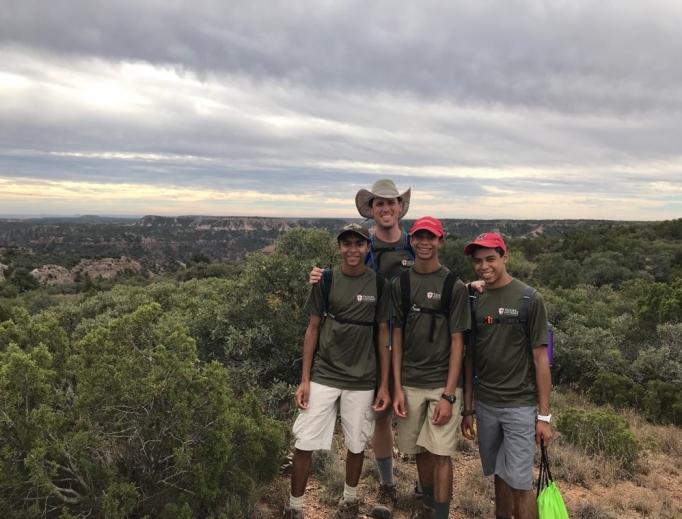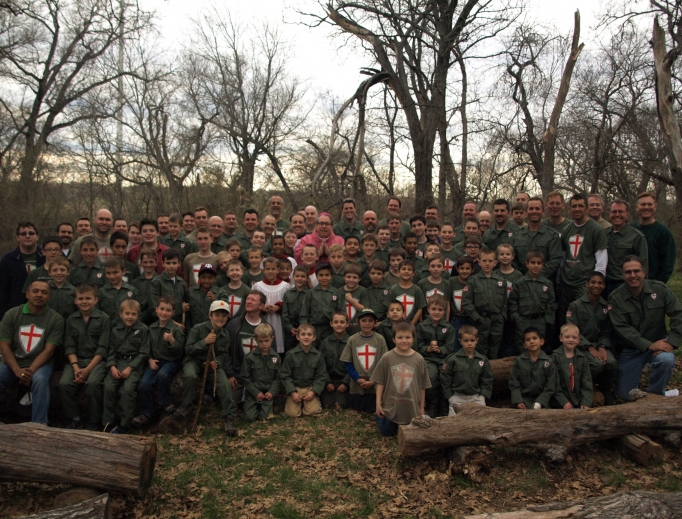Texas Bishop Approves Troops of St. George as the Official Catholic Apostolate of His Diocese
Group achieves diocesan approval for its program of forming fathers and sons in authentic Catholic manhood and holiness.

FORT WORTH, Texas — Five years after its founding, the Troops of St. George achieved a major milestone in its development by becoming a diocesan-approved apostolate for Catholic fathers and sons.
Bishop Michael Olson of the Diocese of Fort Worth, Texas, gave the Catholic organization official ecclesiastical approval May 16, concluding a nearly yearlong vetting process for the Catholic organization, which has now more than 50 troops spread through 23 U.S. states, with a significant contingent located in Texas.
“Congratulations on this important step in the life of the Troops of St. George, and be assured of my prayerful support,” the bishop wrote in his May 16 letter approving its status in the diocese.
The Troops of St. George now joins other diocesan-approved options for Catholic faith formation such as the American Heritage Girls troops, Girl Scout troops and Scouts BSA troops that are chartered by Catholic parishes in the Fort Worth Diocese.
Dr. Jeremy Lustig, national executive director of the Troops of St. George, told the Register that the organization is pleased to have diocesan approval. He said several other dioceses and parishes have requested this diocesan recognition, so they can be assured the organization is a properly vetted Catholic apostolate with canonical oversight.
“This proves who we are, and I expect we will have more growth from this, actually,” Lustig said.
The Troops of St. George began in 2013 in the midst of concern about the membership changes at the Boy Scouts of America. However, Lustig explained the Troops of St. George is not a Catholic “substitute” for the Boy Scouts.
Early on, the leadership made an intentional decision to develop the organization into a Catholic apostolate with a mission to form Catholic men, integrated with the sacraments.
“We’re really our own entity, and I don’t think there are any other organizations like us,” he said.
These troops engage in outdoor-based adventures and activities, such as archery, hiking, camping and boating. Campouts include Mass, praying the Angelus and a campfire Rosary. Fathers and sons have to be members together, and a parish priest has to be part of the troop.
Lustig said this allows boys to consider the vocation Jesus Christ may be calling them to and gives them a model of how Catholic men pray and worship God.
The model also provides an opportunity for fathers to learn from other fathers how to model Jesus Christ and his holiness to their sons. Camping events typically will see a priest come join them and offer the Mass.
Andrew Hightower, a Catholic father of four boys, and the captain of Troop 5 based out of St. Elizabeth Ann Seton parish in Keller, Texas, told the Register that the faith formation for him and his sons has been a “really positive experience.”


Troop 5 has 40 registered families, and the father and sons have enjoyed adventures camping in various parts of Texas. Hightower said one memorable occasion for him and his boys involved a spring canoe trip that became a battle against a torrential downpour.
“You could barely see just 10 feet away,” he recounted.
But the program has also helped encourage his boys to deepen their prayer life: Their love of the Rosary has deepened around the campfire.
Diocesan Vetting
Marlon De La Torre, the director of evangelization and catechesis for the Diocese of Fort Worth, told the Register that the diocese was impressed with the program’s desire to reflect Catholic values, be faithful to the magisterium, and form masculinity in line with the cardinal virtues (prudence, temperance, justice and fortitude) and the theological virtues (faith, hope and love).
The diocese thoroughly examined the mission statement, program and materials for doctrinal conformity with the Catechism of the Catholic Church, made sure Scripture was presented in a sound way, and verified doctrine and dogma was set out correctly and clearly.
“We made sure their overall approach was sound, which it was,” De La Torre said.
The diocese will provide a mechanism of long-term accountability, as Bishop Olson will serve on the board and its advisers. The organization will be able to communicate directly with the bishop and the diocesan office of evangelization and catechesis over any questions related to Catholic formation.
De La Torre said the bishop sees the program as another alternative for families, not a replacement for Catholic Scouting, which continues to enjoy the approval of the diocese at this time.
Fathers and Sons in Faith
Bishop Olson approved the decision to go ahead with approval because he saw the Troops of St. George’s potential for forming fathers and sons together in the faith. Sons will get a model of “how their dads live and practice a Catholic worldview,” according to the bishop’s May 16 letter, and fathers will also have peers and mentors strengthening them to “lead their sons in a profound Catholic way.”
Hightower said the organization has helped him become a better father to his boys. His own father had not been in the picture growing up, and seeing the example of other fathers has been a source of encouragement for him.
Hightower added that some of the boys in the troop also do not have a father in their lives, for various reasons. But the beauty of the program is those boys’ mothers may designate a Catholic man they want to be a mentor and role model for their sons, and that fulfills the program’s requirement for father-son membership.
“The Troops of St. George really espouse a genuine sense of conversion, of witness and discipleship,” De La Torre said. “They really are trying to form young men in the Catholic faith … to help them know and understand they are disciples first, they’re sons of God first, and their mission is really to proclaim the Kingdom of God.”
Peter Jesserer Smith is a Register staff writer.
- Keywords:
- peter jesserer smith
- troops of st. george
















